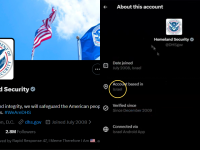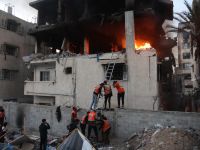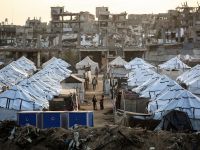After a five-year inquiry that at times seemed near collapse because of disagreements with Saudi Arabia, American authorities said Tuesday that they were close to bringing charges against Saudi militants for the 1996 truck bombing at the Khobar Towers apartment building that killed 19 American airmen, according to a report by the New York Times.
The paper said it was unclear when the indictments might be returned or whether any of the dozens of Saudis already in jail in connection with the bombing would be among them. It was also uncertain whether any of those likely to be cited in the charges could actually be brought to the United States to stand trial.
The federal grand jury investigation has been conducted by the FBI and prosecutors in the Eastern District of Virginia.
According to the paper, the case has for years been swept up in the changing relationship between the United States and Iran, which some counter-terrorism officials have blamed at least in part for helping to mastermind the attack, through officers of its state intelligence service.
Some officials said that it now appeared unlikely that any Iranian officials would be accused of complicity in the bombing, although the complete list of people to be charged, their nationalities and possible links to foreign governments remained unclear.
Iran has rejected as "baseless" allegations that it was involved in the attack, responding to reports that the FBI list of suspects reportedly given to the White House included names of Iranian government officials.
The New Yorker magazine reported early last month that FBI Director Louis Freeh waited until former president Bill Clinton left office to hand the list over because he did not trust Clinton to pursue the matter.
The FBI declined to comment on the reports, telling the news service that it involved an "active case" that it was "aggressively pursuing."
In 1996, a tanker packed with explosives blew up outside the King Abdul Aziz Airbase, known as Khobar Towers, in Saudi Arabia.
The New Yorker reported that a suspect questioned in Saudi Arabia said an Iranian Revolutionary Guard official chose the target.
The official said he was acting on the orders of Iranian supreme leader Ayatollah Ali Khamenei, the report claimed, cited by the BBC.
Iran's Foreign Ministry rejected the report as the work of "people worried because of the warming in relations between Iran and Saudi Arabia."
In February of this year, Saudi Interior Minister Prince Nayef bin Abdel Aziz said that the kingdom was not accusing any party of involvement in the 1996 Khobar Towers explosion, pending the conclusion of investigations.
The minister told reporters at a press conference in Mecca that his country “is not concerned with what the others say and we can not say until now that a certain party was behind the incident, and investigations are essential to make all facts clear.”
The prince was referring to previous reports of Iranian denial of any links to the bombing.
Meanwhile, US officials complained that the Saudis refused to allow agents to interrogate dozens of suspects arrested by the Saudis and to review critical evidence. It took months after the bombing, they said, for the Saudis to agree to allow the FBI to examine a car used by the bombers during their escape, according to the New York Times report.
Some American business executives and others close to the Saudi government told the paper that the Saudis were equally frustrated by the FBI. They said the Saudis complained that the bureau was reluctant to accept the validity of evidence gathered by the Saudis, suggesting that the attack was carried out by Saudi dissidents with the help of Iran. The evidence, they said, included videotapes of confessions by some suspects and wiretaps – Albawaba.com
© 2001 Al Bawaba (www.albawaba.com)







